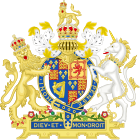| Act of Parliament | |
 | |
| Long title | An Acte for erecting of Hospitalles or abiding and working Howses for the Poore.[2][3] |
|---|---|
| Citation | 39 Eliz. 1. c. 5 |
| Dates | |
| Royal assent | 9 February 1598 |
| Other legislation | |
| Amended by | Hospitals Act 1623 |
| Repealed by | Charities Act 1960 |
Status: Repealed | |
| Hospitals Act 1623 | |
|---|---|
| Act of Parliament | |
 | |
| Long title | An Act for the reviving and making perpetual of one act made in the nine and thirtieth year of the late Queen Elizabeth, intituled, "An Act for erecting of hospitals, and abiding and working houses for the poor." |
| Citation | 21 Jas. 1. c. 1 |
| Dates | |
| Royal assent | 29 May 1624 |
| Other legislation | |
| Amends | Hospitals for the Poor Act 1597 |
| Repealed by | Statute Law Revision Act 1948 |
Status: Repealed | |
The Hospitals for the Poor Act 1597 (39 Eliz. 1. c. 5) was an Act of the Parliament of England. It was enacted during the reign of Elizabeth I and remained in force until the 20th century.
The Disabled Soldiers Act 1592 had permitted the bequest of lands and buildings to establish "houses of correction or abiding-houses" for the poor or for maimed soldiers, but as it had not been legally possible to establish a hospital without a specific royal grant, that Act had had limited effect. As such, the 1597 Act was enacted, allowing any person wishing to establish a foundation to create it by deed at the High Court of Chancery; such foundations would be permanent. However, a minimum endowment was required, sufficient to produce an income of £10 per annum. This Act was initially to apply for twenty years. But it was later revived and made perpetual by the Hospitals Act 1623 (21 Jas. 1. c. 1), and then remained in force until the whole Act was repealed by the Charities Act 1960 (section 39(1) and Schedule 5).
- ^ The citation of this Act by this short title was authorised by section 5 of, and Schedule 2 to, the Statute Law Revision Act 1948. Due to the repeal of those provisions, it is now authorised by section 19(2) of the Interpretation Act 1978.
- ^ These words are printed against this Act in the second column of Schedule 2 to the Statute Law Revision Act 1948, which is headed "Title".
- ^ The title has also been rendered as "An Act for erecting of hospitals or abiding and working houses for the poor": George Walter Prothero. Select Statutes and Other Constitutional Documents Illustrative of the Reigns of Elizabeth and James I. Reprinted in 2005 by Kessinger Publishing. Page 102.